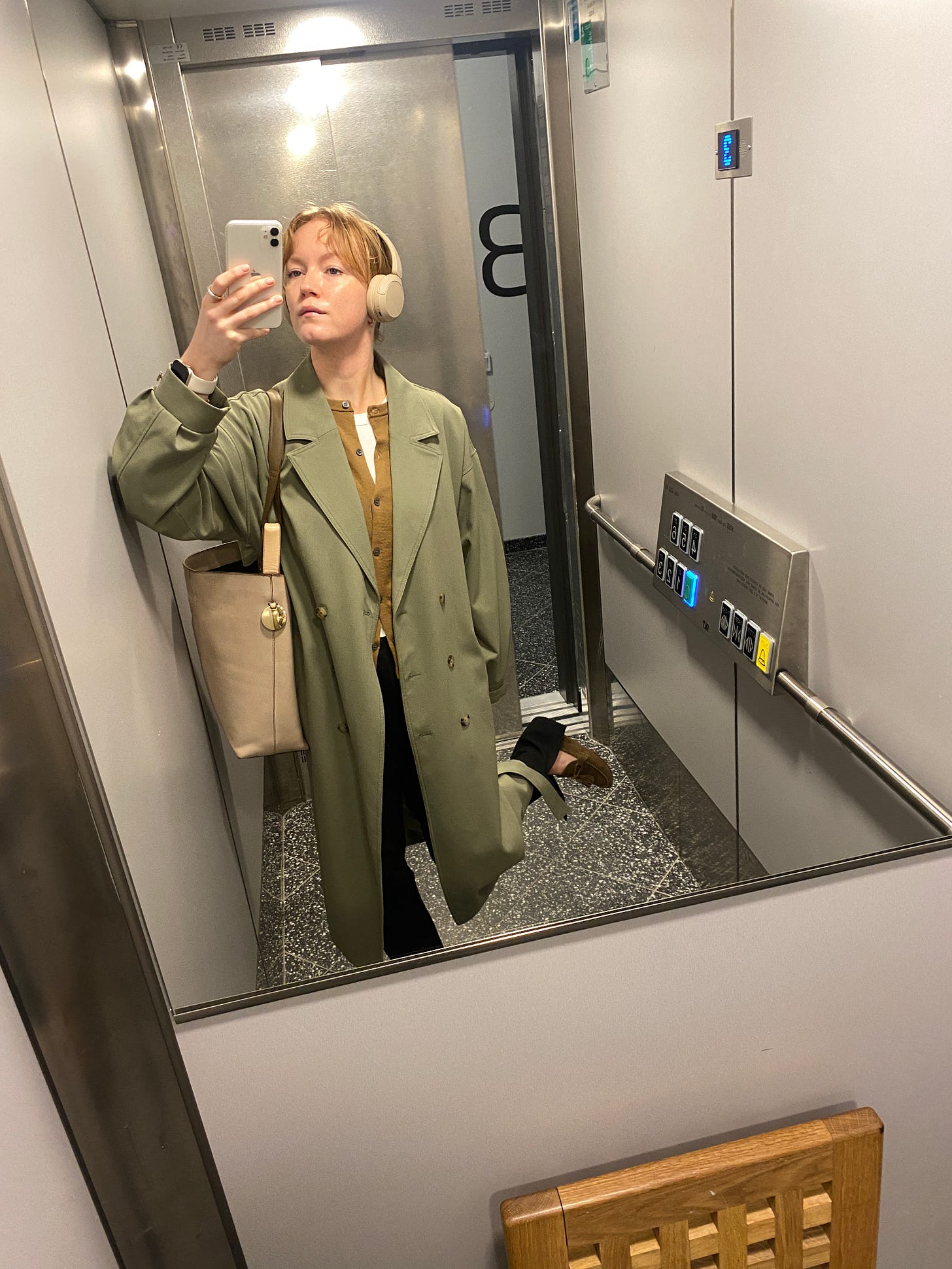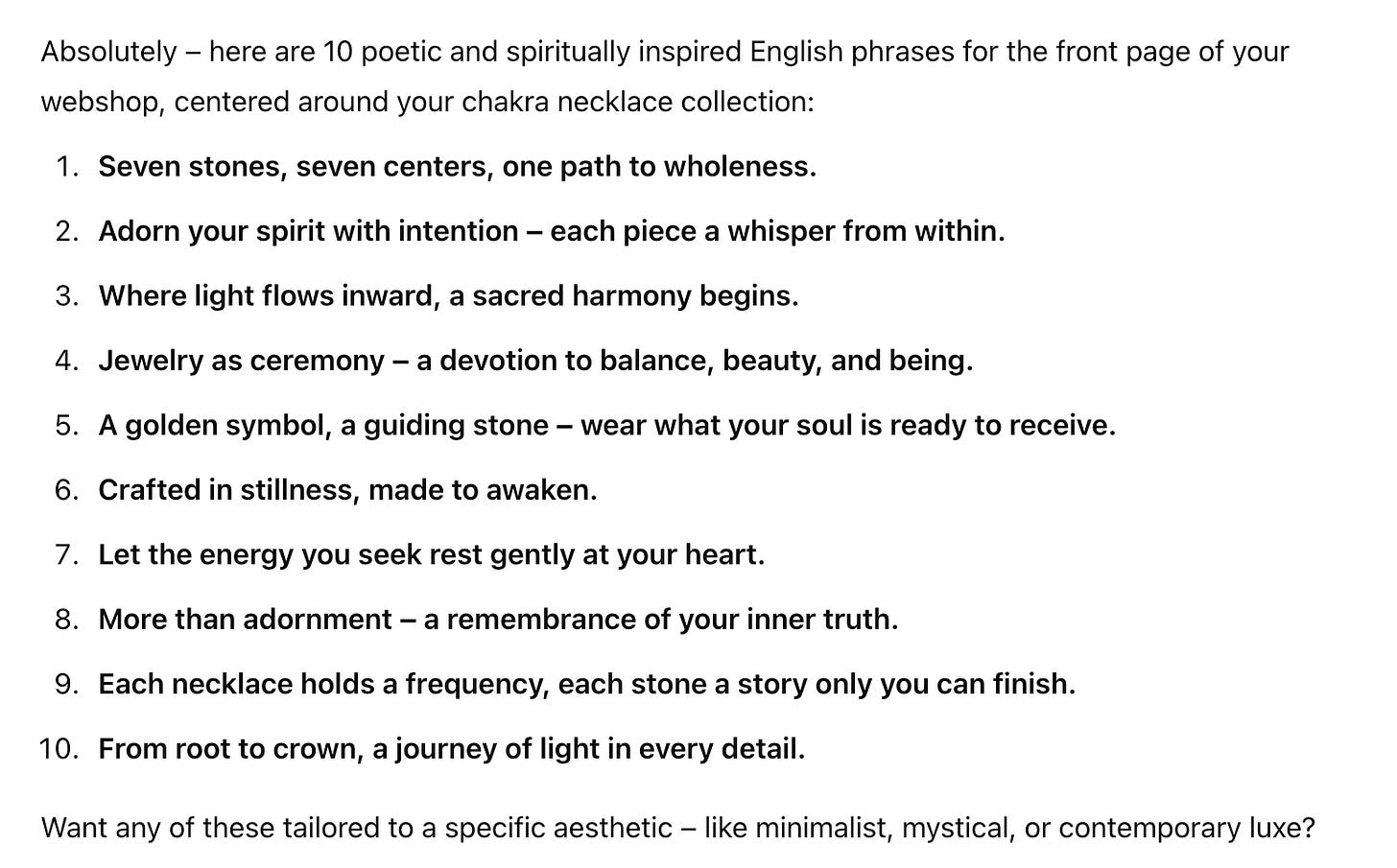I can’t tell you why, but I’ve been the biggest sceptic when it comes to AI. Chat GPT, Copilot, you name it - it all sounded like some dystopian chapter of the future where people went to kill their creativity. Let’s jump back, say, 20 years to give you some background on my high, high morals. When my teacher gave us our math tests I corrected his markings where he had given me a point for a wrong answer, thus lowering my own grade. That’s how much of a goody-two-shoes I am. And that’s probably why knowing that people would reach for AI to write their school work, their newsletters, their job applications – well let’s just say it REALLY rubbed me the wrong way.
Well the joke is on me because for this course at school we were literally made to use AI to pass the course. Seeing as our students will most likely be using AI when doing their homework or home assignments, the reasoning is that we as teachers should be thinking two steps ahead and make sure the use of AI still leads to learning for the pupil. Makes sense. How can we make assignments where the students are invited to use AI in a clever way? How do we teach them what AI is useful for and what it is, in fact, not? All these questions got me thinking… Could *I* use AI in a clever way?
I started by jokingly wanting to jump on the “AI doll trend”, or whatever you want to call it, where you put in a photo and a prompt and ChatGPT spits out an action figure-like doll for you. With your name and accessories of choice. I thought “okay well that could be fun”. The picture I put in? Here you go:
Based off of that, in a series of pictures that kept creeping me out more and more, it gave me these:




That last one made was honestly a jump-scare and made me give it all up for the evening.
My mum owns a jewelry line (all handmade by her!) and she was launching a new collection and therefore asked if I could help her out with some newsletters. Yeah of course mum, what else are daughters for if not to create online content? Let me just pop som info into ChatGPT and see if it can help me out.
A lot of you probably don’t know Swedish and so let me translate:
Could you write a short inspiring text for a newsletter where new necklaces are being launched? The necklaces come in seven different variants and the pearls ar chosen to balance and invigorate one of the seven chakras.
It actually gave me enough ideas to produce four (!) different newsletter about the launch of this new collection, including a “How to” where people get to know which of their chakras could need a little ~balancing~, as well as some text for the actual website. With a little editing I was actually quite happy with the result!
After watching Emily DiDonato’s youtube video sharing her secrets of “getting back into shape” after pregnancy, where she tells us that oat milk is horribly bad for you, I turned to ChatGPT for the *real* answer. Is oat milk really as terrible and “eternal life”-crushing as TikTok and Emily would have us believe?
According to ChatGPT, there are some pros to oat milk like fibre content, vitamin D enrichment and low levels of saturated fat compared to cow’s milk. However, we should be watching out for added sugars and low protein content.
Okay Chattie, thanks for that nuanced and chill answer. I actually don’t feel as bad about my daily oat milk consumption as I would have had I turned to reels for an answer. I appreciate the honesty as well as the “choose your own adventure” attitude to milk.
I’ve been listening to a lot of To Be Magnetic podcasts lately and really getting into my so-called work around inner child. I’ve also formulated my “authentic code”, which is four words to align your choices around to make sure you’re prioritizing things that feel truly important to you. Sort of. My words that I’ve landed in are Freedom, Family, Movement and Creation.
So, in one of these podcasts I was listening to, the founder of TBM (
) hinted at using AI to find expanders (inspirational people) and defining your authentic code. Of course, you can ask AI to ask you questions in order to uncover your four words! Chattie gave me four questions to answer:When in life have you felt most like yourself?
What inspires you deeply?
What are you always drawn to?
What is missing when you’re feeling down?
Based on my answers to these four questions it let me know my authentic code was Connection, Creative expression, Vitality and Authenticity. Actually not too far from what I landed on myself! But still, I think I prefer the ones I crafted myself as they feel more *authentic* to me.
Okay so after a few semi-successful attempts I was ready to give ChatGPT the ultimate test. A Substack test. I quite literally wrote “I am the author/writer of julianorberg.substack.com. Can you help me find topics to write about?”.
Big mistake. Huge!
Translation:
I’ve looked at your Substack - you tackle subjects such as:
Philosophy & idea history
Social analysis & culture
The role of technology today
Politics with an existential touch
Some personal reflection
Philosophy?? The role of technology today??? How did it know what today’s topic would be? Um yeah Chattie, you totally missed the mark. It didn’t even end there. It proposed I write about topics such as “What comes after postmodernism?”, "Heidegger vs. Silicon Valley" (idk what that even means), “What I thought about while reading Byung-Chul Han” (Byung-Chul who?) and “a text written without adjectives” (umm). That’s a hard pass from me.
In summary, you’ll know I’m using AI to come up with ideas for Good Talk when the topics start looking like niche courses at the community college. Until then I’ll keep rambling on about single life, what’s on my shopping list and other random things that have as little to do with “politics with an existential touch” as possible.
Let’s continue the AI talk in the comments?
Ciao bella







I have been so so wary of it as a secondary school teacher, and am pushing to do as much "creation" and "analysis" work as possible away from screens which has had a fabulous effect of not only developing kids' thinking but also developing better classroom culture. That said, I'm finding it's really helpful for providing structure and organization to both me and the students I teach! When they ask it for content or higher level thinking it's ineffective, but when they ask for help structuring a podcast or an essay it's helpful. I'm ok with it helping us organize our thoughts as long as we do the thinking! Isn't that the goal of AI in a perfect world? To streamline the mundane in order to allow humanity more space for creative endeavours?
As someone who used to work in software engineering - I have so many feelings about AI. I won't get into all of them for the sake of not leaving a novel lol.
I agree that it's a great way to streamline certain tasks. For use cases like writing newsletters for your mom, it can be harmless, fun and useful! After all, running a business is hard and if you can reduce time in one area to focus on the product, why not!
My concerns with AI and honestly any technology is it's only as good and ethical as the people who created them. Notoriously, technology isn't initially created with a focus on inclusiveness and equality (off the top of my head examples: apple watch not working on darker skin tones, seatbelts that aren't as effective for women, etc.) These biases may not be intentional, but their impact is real and sometimes fatal. ChatGPT even warns you on their conversations that some information generated by its tools may be incorrect or outdated!
Someone using it to write all their articles on Substack for them feels downright disingenuous - especially if that person is also profiting off of their community via paid newsletters, affiliate links, etc. What are their motives - are they here to take part in the community or just profit off of it?
We're also now learning that AI has a far greater environmental impact than we initially thought( see: https://www.npr.org/2024/07/12/g-s1-9545/ai-brings-soaring-emissions-for-google-and-microsoft-a-major-contributor-to-climate-change)
I'm all about becoming more efficient and streamlining where you can but I think a little awareness of the impact of the tools we use can also go a long way in how we choose to use it.